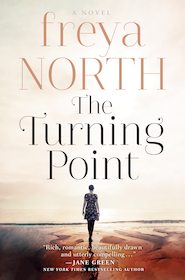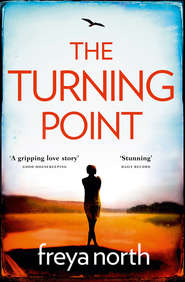По всем вопросам обращайтесь на: info@litportal.ru
(©) 2003-2024.
✖
Freya North 3-Book Collection: Secrets, Chances, Rumours
Автор
Год написания книги
2019
Настройки чтения
Размер шрифта
Высота строк
Поля
‘I don't do heights.’
‘Heights and beaches?’ He looked at her and then, as he looked away, across to the other side he slipped his arm around her shoulder. And after a loaded pause, he turned his head towards hers, leaning in closer. Their eyes locked. And Tess wondered and wondered. And wondered if she should be doing – something – too. And then he stopped and instead, he turned his gaze out to the river and he cleared his throat.
‘I'd hold your hand,’ he said.
It was as if a kiss hung in the air, floating above the water, left suspended like the cradle of the Transporter Bridge was suspended over the River Tees. And Joe and Tess had to climb back into the car and drive off the cradle and onto firm ground and head back home. At that time of night, it was only fifteen minutes back to Saltburn. As they turned into the drive, Tess thought back to the Transporter, calculating that the bridge would be cranking into action again one last time that night, transporting dreams across the water.
She carries Em to her cot and the baby doesn't wake. And she stands, in the soft glow of the night-light, wondering what she's meant to do now. Did he really mean to kiss her? Or was he coming in close so the sounds of the bridge and the wind wouldn't take his words away? But there was his arm around her shoulder too. It might not have been a kiss in the conventional sense but it had equal impact. And he said, trust me. And how she hopes she can.
Go down, Tess! He's going tomorrow; grab him with both hands like an opportunity you have to prevent slipping away to France. Tell him you hate heights and beaches because they both terrify you. Ask him to hold your hand as you tell him the reasons why.
‘Tess?’
Tell him.
‘Yes?’
‘Fancy a nightcap?’
She peers over the banister and he's looking up from the hallway.
‘Cup of tea?’ he suggests instead because the notion of a nightcap should never necessitate such a pause.
‘OK,’ she says. But when it's brewed she doesn't go downstairs and he waits awhile before bringing it up, halfway. They stand there, awkwardly.
‘Thanks,’ she says, ‘for the tea and the Transporter.’
‘I wish I could show you the Milau,’ Joe says.
‘Maybe when you're back,’ Tess says.
He laughs. ‘It's in France.’
Tess feels embarrassed. ‘Oh.’
France. France tomorrow. Tonight I almost kissed her.
‘Anyway –’
‘– anyway.’
And he knows he could take a step up towards her. He could kiss her then. Or he could reach up for her hand from where he's standing now. But there's a mug of hot tea between them and, over and above that, there's the look of startled faun about her now. The moment has passed. There's a flatness – just as her hair is now lank against her head, curtaining her expression, whereas on the bridge, it was buffeted away from her face revealing the dark sparkle in her eyes.
‘Well – night, then, Tess,’
‘Goodnight Joe.’
‘Thanks for –’
‘Thanks for finding a miracle cure for Em.’
He'd gone before she was up. Crept out earlier than he needed to. He'd slept badly; fretful dreams vexing him. He woke deciding it was crazy to have feelings for Tess. Absolute madness. For a start, he didn't know when he'd be back, when he'd have to go again. And anyway, he didn't know how long she'd stay either. And though she'd arrived with hardly anything visible to her name, he sensed she brought a lot of hidden baggage with her. And if she added hers to all of his, there wouldn't be room enough in the house for much else.
Gone to France.Will call.Take care.Joe
Chapter Fifteen (#ulink_e3042d0e-08f9-5425-867d-b6f4a72cda51)
Tess pretended not to notice that Joe was no longer there. She refused to give the answering machine more than a nonchalant glance each time she returned to the house. In the evening, either the television or the radio was on to bypass the taunting silence of the phone not ringing. She had his mobile number, it still shared the hook with the calendar on the kitchen door and every now and then she'd look at it quickly, as if checking the correct quota of eleven numbers. It was the only mobile phone number that she knew off by heart, yet she'd never once rung it. She lacked the confidence to phone just to say, hullo, how are you, how's France.
All of this was very different – the situation, the feelings – from simply missing someone. Missing someone causes one to feel incomplete, it's a vulnerable state. Tess had missed Em in a desperate, primal way when she'd been at work; a creeping, invasive hollowness that was only counteracted when her child was back with her. Over Joe, Tess did not feel fragile or gut-wrenched, she felt simply sad and alone because his company had recently enhanced her life. And though she currently kept the study door shut, as Joe always did when he was working, she couldn't create the illusion that he was in there. It seemed to her that, whichever room she was in, Joe was like an essential item of furniture suddenly gone. Nothing seemed quite right now. The time he'd spent at home recently had been so satisfying for her that it had shrunk her world, made it seem a safer and more intimate place; his presence had formed a moat and a drawbridge around her. It was a feeling of self-sufficiency. But with him gone, she felt cut off.
Strangely, though she had thought about Mary even while Joe had been home, her allegiance was now so firmly with Joe that whatever it was that prevented him mentioning his mother, was enough for Tess to respect. If there were sides to be taken, she was on his. Thoughts of Seb too, had dispersed as if they'd been but lively sparks from a bonfire – which have no real substance, not even ash. So it was unnerving, to say the least, to come across both people in quick succession a week after Joe's departure.
‘Laura – she's gone again.’
‘Who has?’
‘Mrs S – or in your case, Mary.’
‘Mary? You sure?’
‘Just checked her room.’
‘The morning room?’
‘Not there.’
‘Playing rummy?’
‘No.’
‘Sunroom? She does like the sunroom – sits herself down right in the far corner where she can gaze out to sea.’
‘She's not in the sunroom. I told you, Laura – she's scarpered.’
‘Well, we know where she'll be headed.’
‘Doesn't make it any the less a pain in the arse – I've got better things to do than chase through town for an eighty-year-old. She's crafty, that one. She never does as she's told. I don't know why you've such a soft spot for her.’
‘She's not eighty – she's only seventy-five. It's her condition that makes her seem older.’
‘Over there! Look, Laura – there she is, pegging off past Garnet Street.’
Laura had already left the room.
There was a scatter of elderly residents of the town taking the air on the elevated position of Marine Parade above the pier and beach. Laura had never become inured to their grace – their pace, the way they sat or stood, content for silent companionship, patient with each others’ witterings. Mary, however, was practically jogging. It was as if the pensioners enjoying the view were acting their age while Mary defiantly was not. She appeared oblivious to the melancholy expanse of the North Sea, the majestic dominance of Huntcliff reaching out into it, the breadth of golden sands. She was walking off with a pace and purpose at odds with both her peers and the vista.
Laura always preferred to run before she could walk – because she knew it could startle the elderly lady if she approached at speed. So she'd run until Mary was in reach, then she'd walk briskly until she was abreast when finally she'd slow down and match her stride.











